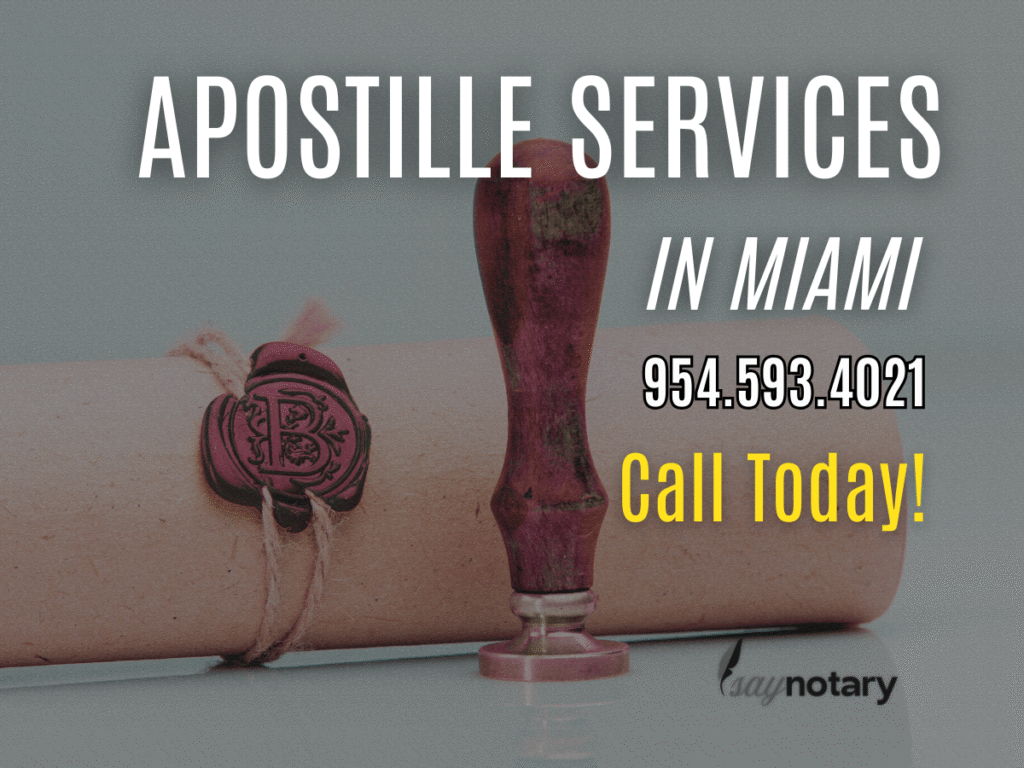
How to Apostille Documents in Miami – Step by Step Guide (2025)
If you need to use a document abroad, chances are you will need an apostille. Whether it’s for school, work, marriage, or immigration, many international institutions require your U.S. documents to be legalized. In this guide, we’ll explain exactly how to apostille documents in Miami, what the process looks like, and how Say Notary can help you get it done quickly and stress-free.
What Is an Apostille?
An apostille is an official certification issued under the Hague Convention that makes a U.S. public document valid for use in another member country. It verifies the authenticity of the signature, stamp, or seal on your document.
📌 Important: An apostille does not validate the content of the document — it only certifies its origin.
Who Needs an Apostille in Miami?
Apostilles are required when you need to use U.S. documents abroad. Common examples include:
Birth, marriage, and death certificates.
Divorce decrees.
Diplomas, transcripts, and school records.
Power of attorney and notarized documents.
Corporate documents such as Articles of Incorporation.
If you live in Miami and are moving, studying, or conducting business abroad, you will likely need an apostille.
Step 1 – Check Your Document Type
Not every document can be apostilled directly. First, determine whether your document is:
A vital record (birth, death, marriage certificate).
An educational record (diploma, transcript).
A notarized document (affidavits, power of attorney).
Each type may have different requirements before apostille.
Step 2 – Notarize Your Document (if needed)
Some documents, such as affidavits or copies, must be notarized first before they can receive an apostille.
At Say Notary, we provide professional notary services in Miami, including Remote Online Notarization (RON), so you don’t have to leave home.
Step 3 – Submit to the Florida Department of State
Once notarized (if required), your document is sent to the Florida Department of State for apostille.
Standard processing time: usually 5–10 business days.
Expedited processing is sometimes available.
If you’re not in Tallahassee, the process can feel complicated — but that’s where we come in.
Apostille Online vs In-Person in Miami
At Say Notary, we offer both options:
In-person or local drop-off: Ideal if you’re in Miami and want personalized assistance.
Completely online (digital): Perfect for documents notarized by RON or certified copies.
No matter where you are, we handle the process for you. You can even mail us your documents if you’re outside Florida.
Apostille for Out-of-State Documents
Each U.S. state issues its own apostilles. If your document was issued in another state, it must be apostilled there.
However, Say Notary can guide you through the process and help coordinate apostilles from outside Florida as well.
Why Choose Say Notary for Apostille Services in Miami
✅ Fast and reliable service.
✅ Options for online and in-person apostilles.
✅ Bilingual team (English & Spanish).
✅ Personalized support for individuals and businesses.
Our goal is to make the apostille process as simple and stress-free as possible.
Frequently Asked Questions
How long does an apostille take in Miami?
Processing usually takes 5–10 business days, but expedited options may be available depending on the document.
Can I apostille a birth certificate in Miami?
Yes, as long as it was issued in Florida. Out-of-state birth certificates must be apostilled by the state where they were issued.
How much does an apostille cost in Florida?
Fees vary depending on the document and processing time. Contact us for an accurate quote.
Get Your Documents Apostilled Today
Don’t waste time with delays or confusing processes. At Say Notary, we handle your apostille from start to finish.
Fast. Reliable. Stress-free apostille services in Miami.

